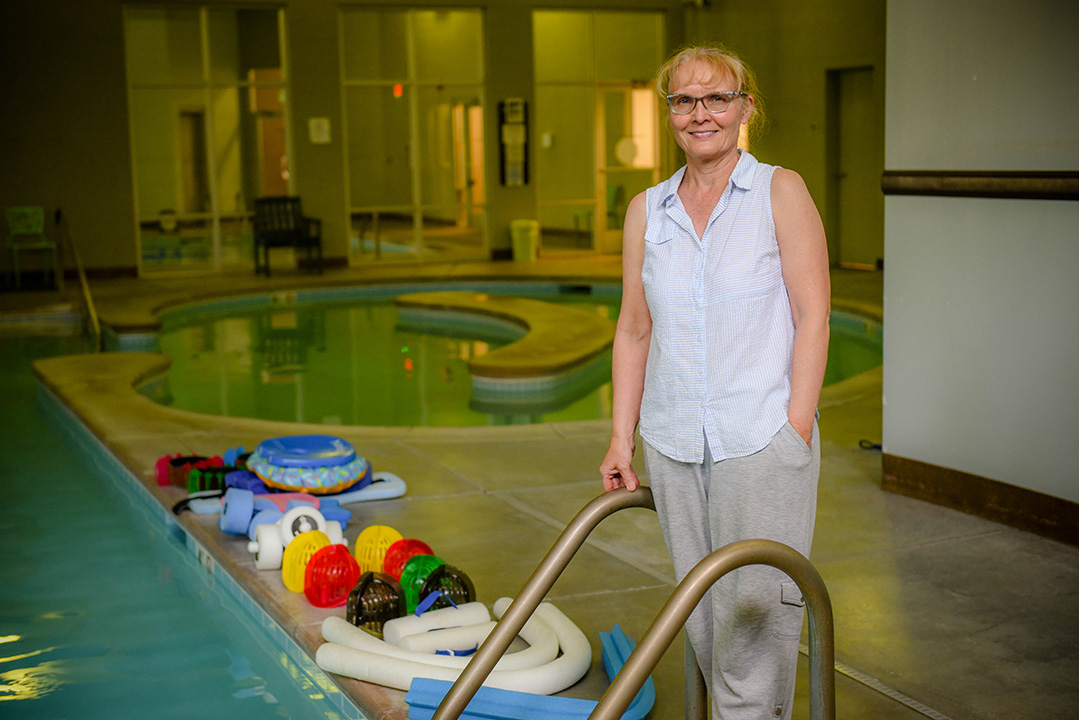
November 28, 2023
Water or aquatic exercise has many advantages over traditional land-based exercises, especially if you find exercising on land too painful, difficult, or taxing. Exercising in water is as beneficial as exercising on land if performed at a similar intensity and if properties of the water are used to your advantage. Individuals who are unable to move well on land may also experience an emotional or psychological boost from success in the water, a bonus for folks on any health and wellness journey.
As with any exercise program, the key to success is consistency. The exercises you choose should be enjoyable, not painful. If you find certain exercises too painful, you are less likely to continue, which is why I encourage folks to add water exercise into their regular workout routines.
The buoyancy of water reduces the weight on your joints and muscles which allows for more comfortable upright exercise. The pressure of the water also reduces joint and tissue swelling and increases blood volume back to the heart and lungs, ultimately allowing for a better workout with less stress on your heart and musculoskeletal system. Warm water temperature combined with buoyancy also promotes relaxation, decreases pain levels, and allows for more freedom of motion. The combination of these elements is shown to improve exercise tolerance, range of motion, and functional strength for many individuals, which counteracts the negative effects one may experience from exercising on land. Simply put, for many, exercise in the water means a more enjoyable workout, less pain, and more success in meeting strength, balance, and fitness goals.
There’s also research to support that doing athletic cross-training in water can be more beneficial for sports requiring jumping and running because there is less impact on joints and muscles, and less risk of injury.
Aquatic exercise is great for your brain, too. It increases neurochemicals that decrease inflammation and arterial stiffness in the brain and improves blood flow, which has been shown to improve cognitive and memory functions.
Lastly, the combination of water pressure, resistance, and expanded range of motion promotes balanced muscle strengthening that is harder to achieve with land-based exercising. Since it is less painful and easier to move in the water, you can exercise for a longer period of time, which improves strength, balance, and endurance needed to complete daily activities, like walking.
As with any new exercise program, be sure to check in with your health care provider to determine if water exercise is right for you, especially if you have cardiac or lung problems, as there may be special considerations that need to be discussed before you begin. If you do add water exercise to your workout routine, be sure to start slowly and remember that movement under the water is resisted, impacting the speed at which you can move. It is also important to stabilize your spine throughout your water workout to prevent injury.
Everyone can benefit from water or aquatic exercise especially people with arthritis, fibromyalgia, balance deficits, athletes recovering from injury, and those with chronic back pain. If you struggle with land-based exercise and activity, you may find that water exercise is the right fit for you. If you’re looking for a place to begin, our local pools offer classes regularly. I hope to see you there.
Mary Stevens is a Physical Therapist at St. Peter’s Health Rehabilitation and specializes in aquatic therapy.


